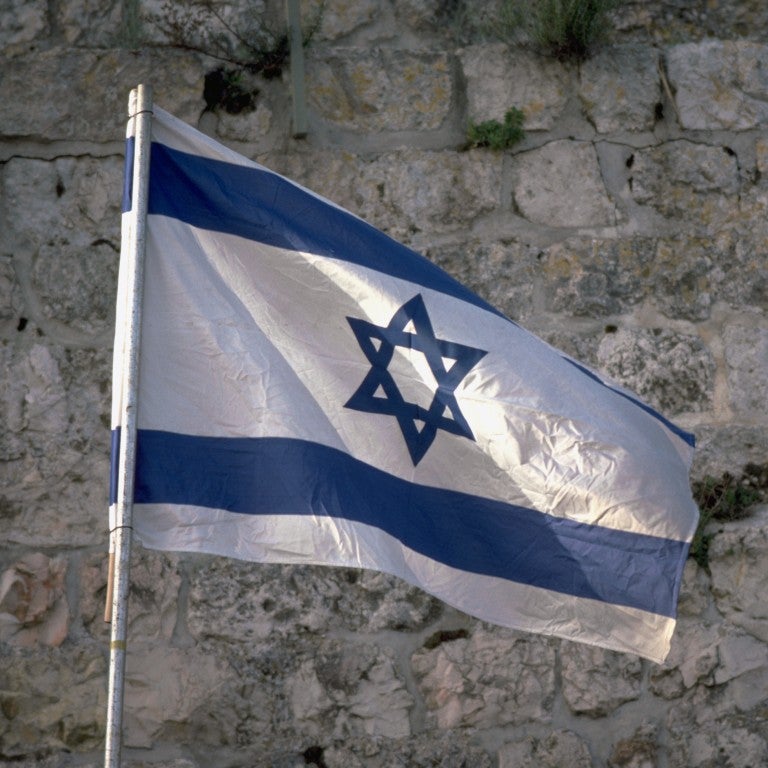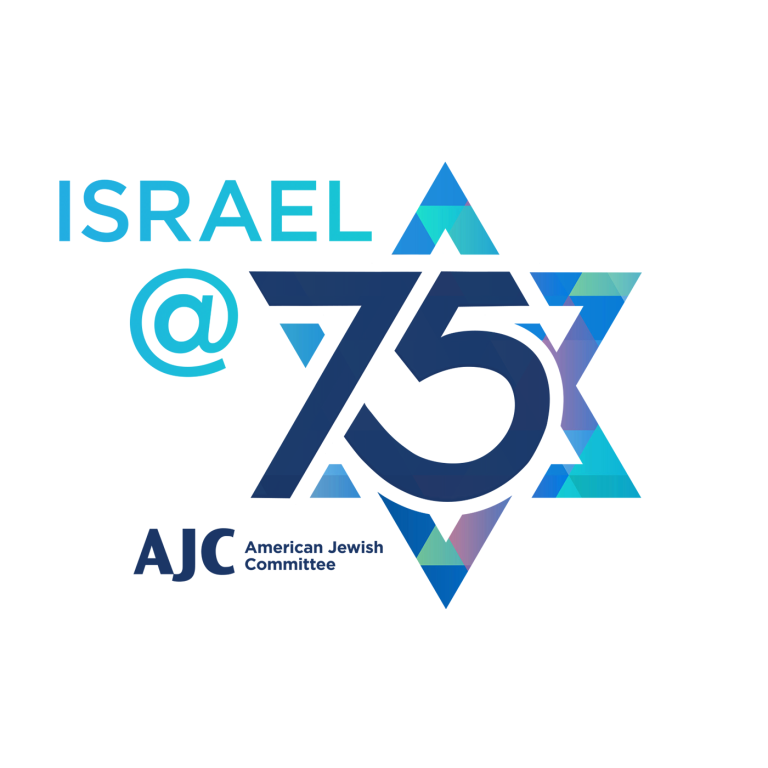April 14, 2023
In Israel, freedom and sacrifice are inextricably linked. As part of the struggle to maintain the country’s existence as the only Jewish and democratic state in the Middle East, soldiers have lost their lives in battle and civilians have been killed in terrorist attacks. That’s why just before celebrating Yom Ha'atzmaut, or Independence Day, Israel always honors those who made the ultimate sacrifice with Yom Hazikaron, or Memorial Day.
As the indivisible pair of Israeli national holidays approach, AJC offers 10 nonfiction titles that illustrate why Israel observes these two occasions side by side. First, read up on the Jewish nation’s legendary efforts to defend itself. Then learn about the remarkable contributions Israel has made to the world over its 75 years of existence.
Yom Hazikaron (Israel’s Memorial Day)
1. Shadow Strike: Inside Israel’s Secret Mission to Eliminate Syrian Nuclear Power
By Yaakov Katz
What sound does an airstrike in the desert make if it’s never acknowledged by the attacker or the target? Before the world worried about the nuclear threat posed by Iran, Israel identified the existential capacity that was being developed by neighboring Syria and quietly erased it.
Israeli Journalist Yaakov Katz presents a blow-by-blow account of the risk-laden 2007 airstrike that destroyed a nuclear reactor under construction in the Syrian desert.
For Israel, the secrecy of the attack was crucial in curbing retaliation by Syria. Israel only confirmed it 11 years later, as evidence that its Arab neighbors had nuclear aspirations long before the Iran nuclear agreement became a global concern. It also demonstrated that nuclear threats can be eliminated.
“This book shows how, if needed, it can still be done,” Katz writes. “What happened in 2007 is a playbook for how one country neutralized an existential threat.”
Available wherever books are sold.
2. The Eve of Destruction: The Untold Story of the Yom Kippur War
By Howard Blum
On October 6, 1973, Israel was caught off-guard when Egypt and Syria launched a joint attack on the Jewish Day of Atonement. It took three weeks for Israel to overcome the Arab advantage and drive the armies back behind the 1967 ceasefire lines.
In The Eve of Destruction, author Howard Blum tells the back story of how a double agent for both Israel and Egypt tricked the Jewish state into letting its guard down, leaving it vulnerable to attack. It explores the emotional strain of this fateful disadvantage on Israel’s soldiers and top leaders and the strategy they employed to eventually triumph.
In many ways, this final act of belligerence by Egypt against Israel set the stage for the peace treaty signed by the two countries’ leaders, Egyptian President Anwar Sadat and Israeli Prime Minister Menachem Begin, six years later.
To mark the 40th anniversary of that historic truce, AJC talked to Kenneth Stein, a former advisor for President Jimmy Carter, about the impact of that treaty then, now, and going forward.
Available wherever books are sold.
3. Pumpkinflowers: A Soldier's Story of a Forgotten War
By Matti Friedman
While many of Israel’s historic battles and operations have monikers, Matti Friedman’s memoir Pumpkinflowers proves that a battle without a name can be just as cruel to soldiers and just as critical for a country.
In 1998, between the first and second Lebanon Wars, Friedman and comrades were deployed to an outpost dubbed “Pumpkin” to secure the border between Israel and southern Lebanon. Friedman recounts the novel tactics of warfare that unfolded there, including a viral video of a Hezbollah attack, roadside bombs, and proclamations by Hezbollah of an enduring ideology. Twenty years later, these weapons almost seem cliché. But they were unconventional at the time.
From his vantage point of the battlefield and with the benefit of hindsight, Friedman highlights the ambiguities of war and the honest and often fatal mistakes made by soldiers. “Flowers” is the term used by Israeli military to refer to casualties. Friedman’s elegy captures how much can be lost and learned between battles in a never-ending conflict.
Listen to a conversation with Friedman about the media and Israel on a live broadcast of AJC’s podcast from Jerusalem.
Available wherever books are sold.
4. Jerusalem: The Biography
By Simon Sebag Montefiore
In The New York Times’ book review of Simon Sebag Montefiore’s exhaustive Jerusalem: the Biography, the reviewer highlights the blood that has been shed to guard and preserve the Holy City. The entire book is about both valiant and tragic sacrifices.
Nisha Abkarian, Director of AJC Project Interchange, said she recommends the Montefiore book to all participants in the exchange program, which has brought nearly 6,000 leaders from 110 countries to Israel. While a five- to seven-day tour of the Jewish state helps people understand the situation on the ground, she said, a wider lens is necessary to understand Zionism, Jewish attachment to the land, and how antisemitism has colored Jewish-Christian and Jewish-Muslim interactions across millennia.
“The arc between the Shoah and the birth of Modern Israel is incredible and awe-inspiring, but it’s a point along the historical spectrum, an expression of something deeper,” Abkarian said. “Understanding the past helps us understand how we (or any persecuted minority) can emerge from tragedy and oppression into periods of awe-inspiring growth and creativity.”
Available wherever books are sold.
5. Six Days of War: June 1967 and the Making of the Modern Middle East
By Michael Oren
This book is regarded as the definitive analysis of a watershed moment in the history of modern Israel – when Israel’s armed forces crushed an offensive by roughly a half dozen Arab armies in just as many days.
Michael Oren, former Israeli Ambassador to the United States, draws from archives and declassified documents in Israel, the U.S., United Kingdom, and the former Soviet Union and overcomes obstacles to collecting information in Arab countries by combing personal memoirs and interviewing military officials.
“Six Days of War… is easily the definitive study of the subject,” said Steve Bayme, AJC Director of Contemporary Jewish Life. “Oren elucidates the prelude to the war, the diplomacy embedded within and around the conflict, including the critical role of American Jewry, as well as its military dimensions.”
Available wherever books are sold.
Yom Ha’atzmaut (Israeli Independence Day)
6. Start-Up Nation: The Story of Israel’s Economic Miracle
By Daniel Senor and Saul Singer
In Start-Up Nation, the seminal book about Israel’s economy, entrepreneurial success, and miraculous ability to overcome adversity, authors Daniel Senor and Saul Singer make the case that the Jewish state and Silicon Valley are not that far apart.
At the time the book was written, Israel boasted more corporations than any other – second only to the U.S. – listed on the NASDAQ and had launched more start-up companies on a per capita basis than Japan, China, India, Korea, Canada, and all of Europe. Singer and Senor credit innovation, financial policies, venture capital, open immigration policies, and Israel’s military training for much of the country’s success.
“The book reveals a unique characteristic of the Israeli everyday life – in emergency and in routine,” said AJC Jerusalem Director Avital Leibovich, who helped connect Singer to several IDF units for a chapter of the book. “The everlasting strive for creativity, solution finding and knowledge to contribute to the world, is amongst other things, what made Israel so successful as a country.”
Available wherever books are sold.
7. Thou Shalt Innovate: How Israeli Ingenuity Repairs the World
By Avi Jorisch
While the authors of Start-Up Nation point to innovation as one of many rational reasons why Israel has become an economic success, author Avi Jorisch provides a spiritual explanation: Israel’s sacred duty to repair the world. In his book Thou Shalt Innovate: How Israeli Ingenuity Repairs the World, Jorisch, a specialist on issues relating to terrorism, threat finance, and extremism in the name of Islam, immerses himself in lighter subject matter.
Thou Shalt Innovate profiles 15 Israeli inventors and inventions that have changed the world for the better: from modern drip irrigation to the Iron Dome Missile System, from the flash drive to the Internet firewall, and from a drug to treat multiple sclerosis to a tiny pill equipped with a camera to find abnormalities inside the human body.
Using these examples and how they have had a global impact, Jorisch illustrates how Israel is answering the call of tikkun olam, repairing the world.
Available wherever books are sold.
8. Let There Be Water
By Seth Siegel
Water has long been considered a symbol of life. The fact that it covers 70 percent of the planet is largely what makes life possible. Yet dozens of countries lack clean water or face drought. In Let There Be Water, author Seth Siegel describes how Israel, one of the world’s driest countries, conserves this valuable resource and shares it with the developing world.
For example, contrary to the popular method of flooding fields with water to hydrate crops, Siegel explains how Israel’s drip irrigation system channels water to the roots, saving massive amounts of water and watering crops far more effectively. He also discusses desalination technology, a process of filtering and distilling salt water into drinking water that recently galvanized Palestinian, Jordanian, and Israeli leaders in a joint endeavor.
But it’s not just science that saves the day, says Siegel, a Senior Water Policy Fellow at the University of Wisconsin. Israel’s government employs policies that have encouraged more than 200 water technology companies to incubate there. Furthermore, water is not cheap. It is priced as a valued resource, so there’s an incentive for Israeli citizens not to waste it.
Available wherever books are sold.
9. Israel: A Concise History of a Nation Reborn
By Daniel Gordis
Hard to believe a 576-page tome could be considered concise. But even a comprehensive analysis of Israeli progress must leave out a few details. Author Daniel Gordis starts his opus Israel: A Concise History of a Nation Reborn with Theodore Herzl’s vision and moves on from there.
Using poetry and song lyrics to convey the tone of the times, he explains how the tiny state – no larger than New Jersey – became a cultural, economic, and military giant. But he does so without glossing over Israel’s errors over the years.
Laura Shaw Frank, AJC Associate Director of Contemporary Jewish Life, recommends the book as a must-read for anyone trying to understand Israel.
"Gordis' book is an excellent overview that delves broadly into Israel's history, addressing not only politics and military conflict, but also social and cultural developments," Frank said.
Available wherever books are sold.
10. No Room for Small Dreams: Courage, Imagination and the Making of Modern Israel
By Shimon Peres
Some called him a dreamer. Others called him a schemer. In his memoir, former Israeli President and Prime Minister Shimon Peres described moments when he had been both.
Published posthumously in English a year after Peres died from complications of a stroke, No Room For Small Dreams: Courage, Imagination and the Making of Modern Israel describes how Peres took one bold leap after another to secure his country’s future – including a few missteps. Though the memoir has been published in English, Hebrew, and French, he reportedly recorded it in English to inspire the widest audience.
During a political career that spanned more than seven decades, Peres bolstered Israel’s arsenal, economy, and tech industry. He also enhanced the potential for peace with the Palestinians, engineering the 1994 Israel-Jordan Peace Treaty. Together with Yitzhak Rabin and Yasser Arafat, he won the 1994 Nobel Peace Prize for the Oslo Accords peace talks.
Peres addressed AJC meetings on a number of occasions, notably AJC’s 2001 Annual Meeting in Washington, D.C., where he shared the platform with President George W. Bush, Mexican President Vincente Fox, and German Foreign Minister Joschka Fisher.
"Among all Jewish organizations, I have found that yours is the most profound,” Peres said of AJC. “Your organization was the first one to focus on the globality of our life. I don't know any other organization that pays so much attention to what's happening outside the United States, with respect to and beyond Jewish life, from India to Germany to France and in many other places.”
“Shimon Peres will forever be remembered as one of the great visionary leaders of the Jewish people,” said AJC CEO David Harris, upon the leader’s death in 2016. “Peres had extraordinary energy, boundless optimism, and future-oriented vision, not only about the possibilities of peace and coexistence in the region, but also about the exciting pathways of new technologies for the benefit of humankind—from nano-science to mapping the brain.”
Available wherever books are sold.
What books would you recommend? Share your picks with us on AJC’s Twitter and Facebook.
Go deeper: Test your knowledge of the Jewish State by taking our quiz!





